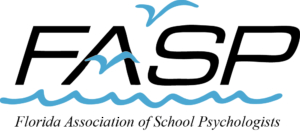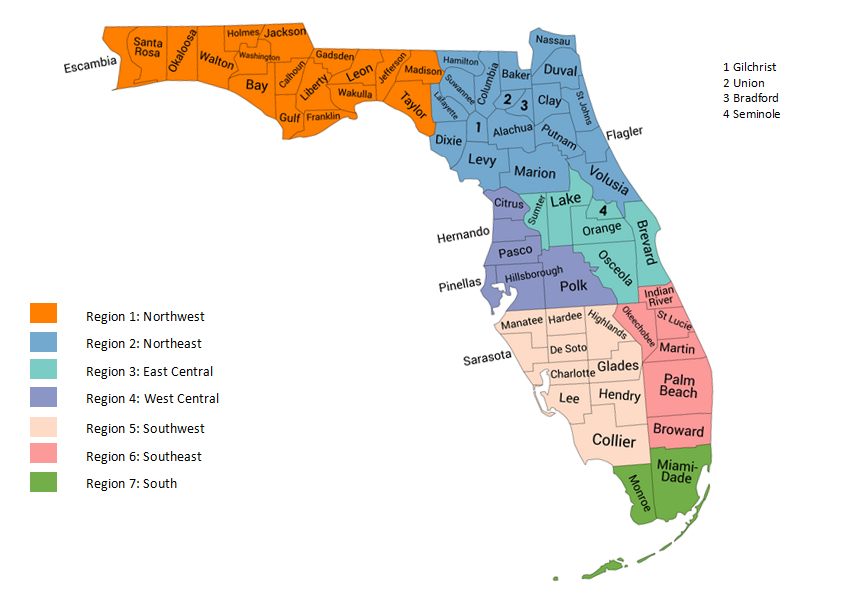Our Mission
FASP’s mission is to advocate for the mental health and educational development of Florida’s children, youth, and families and to advance the profession of school psychology.
Our Priorities
- Address the Critical Shortage of School Psychologists in Florida
- Expand and Increase School-Based Behavioral and Mental Health Services
- Promote Safe and Healthy School Climates
- Ensure Fair and Equitable School-Based Practices
- Engage in Professional Advocacy
FASP Officers
President: Amy Clark – president@fasp.org
President-Elect: Jamie Donnelly – presidentelect@fasp.org
Immediate Past President: Joe Latimer – pastpresident@fasp.org
Secretary: Susan Hatcher – secretary@fasp.org
Treasurer: Amy Randell – treasurer@fasp.org
Regional Representatives
Region 1 – Northwest Region: Sharon Bartels-Wheeless – northwest@fasp.org
Region 2 – Northeast Region: Lara Manalo – northeast@fasp.org
Region 3 – East Central Region: Liz French – eastcentral@fasp.org
Region 4 – West Central Region: Daniella Maglione – westcentral@fasp.org
Region 5 – Southwest Region: Dena Landry – southwest@fasp.org
Region 6 – Southeast Region: Iryna Kasi – southeast@fasp.org
Region 7 – South Region: Joan Kappus – south@fasp.org
Standing Committees
Administration & Supervision: Sharon Bartels-Wheeless – administration@fasp.org
Annual Conference: TBD – faspannualconference@gmail.com
Awards: Rochelle Poole – awards@fasp.org
Bylaws: Joe Latimer – pastpresident@fasp.org
Continuing Education: Rosalind Sheffield-Ballew – CE@fasp.org
Diversity: Maria (Maritza) Gallardo-Cooper – diversity@fasp.org
Ethics & Standards of Practice: Ralph Eugene Cash – ethics@fasp.org
Membership: Jorge Pajares – membership@fasp.org
Newsletter: Ashley Womble – newsletter@fasp.org
Planning & Development: Shaniya Morris – planning@fasp.org
Private Practice: Paula Lewis – privatepractice@fasp.org
Professional Development: Fransheska Portalatin – PD@fasp.org
Public Policy & Professional Relations: Austin Cole – publicpolicy@fasp.org
Research: Iryna Kasi – research@fasp.org
Student Delegate: Isabella Espino – studentdelegate@fasp.org
Technology and Communication: Karly Mendoza – technology@fasp.org
Training & Credentialing: Sarah Lawson – training@fasp.org
Special Committees
Interest Groups: Joan Kappus – interestgroups@fasp.org
Public & Media Relations: Amber Rivera – PR@fasp.org
Mental Health & Crisis: TBD – mentalhealth@fasp.org
Liaison Positions (not appointed)
FASP’s Children’s Services Fund, Inc.: Sarah Valley Gray – csfi@fasp.org
FLDOE Consultant: Mirtha Brennan – Mirtha.Brennan@fldoe.org
NASP Delegate: Monica Oganes – monica@monicaoganes.com
FASP Lobbyists: Bob Cerra – bobcerra@comcast.net, John Cerra – cerraj@comcast.net
F ASP Business
ASP Business
The use of the FASP logo (printed or electronic) must be pre-authorized by the President or the Executive Board.
FASP’s Policies, Procedures, & Positions Manual
Executive Board Meeting Archives
- October 2025
- September 2025
- August 2025
- July 2025
- June 2025
- May 2025
- April 2025
- March 2025
- February 2025
- January 2025
Annual Business Meeting Archives
- FASP Annual Business Meeting Minutes – October 2025
- FASP Annual Business Meeting Minutes – November 2024 (TO BE APPROVED AT THE 2025 ANNUAL BUSINESS MEETING)
- FASP Annual Business Meeting Minutes – November 2023
- FASP Annual Business Meeting Minutes – October 2013
- FASP Annual Business Meeting Minutes – October 2012
- FASP Annual Business Meeting Minutes – November 2011
- FASP Annual Business Meeting Minutes – November 2010
- FASP Annual Business Meeting Minutes – October 2009
- FASP Annual Business Meeting Minutes – October 2008
- FASP Annual Business Meeting Minutes – November 2007
- FASP Annual Business Meeting Minutes – October 2006
- FASP Annual Business Meeting Minutes – November 2005
- FASP Annual Business Meeting Minutes – November 2004
Motion Summaries
 Regional Representatives shall serve as members of the Executive Board. These representatives shall be nominated from seven regions of the state, which shall be determined by the Executive Board. Regional Representatives must reside or work in the region that they represent.
Regional Representatives shall serve as members of the Executive Board. These representatives shall be nominated from seven regions of the state, which shall be determined by the Executive Board. Regional Representatives must reside or work in the region that they represent.
FASP’s seven regions and their respective counties are as follows:
- Region 1 – Northwest: Bay, Calhoun, Escambia, Franklin, Gadsden, Gulf, Holmes, Jackson, Jefferson, Leon, Liberty, Madison, Okaloosa, Santa Rosa, Taylor, Wakulla, Walton, Washington.
- Region 2 – Northeast: Alachua, Baker, Bradford, Clay, Columbia, Dixie, Duval, Flagler, Gilchrist, Hamilton, Lafayette, Levy, Marion, Nassau, Putnam, St. Johns, Suwannee, Union, Volusia.
- Region 3 – East Central: Brevard, Lake, Orange, Osceola, Seminole, Sumter.
- Region 4 – West Central: Citrus, Hernando, Hillsborough, Pasco, Pinellas, Polk.
- Region 5 – Southwest: Charlotte, Collier, Desoto, Glades, Hardee, Hendry, Highlands, Lee, Manatee, Sarasota.
- Region 6 – Southeast: Broward, Indian River, Martin, Okeechobee, Palm Beach, St. Lucie.
- Region 7 – South: Dade, Monroe.
The functions of this committee are directed toward those professional endeavors concerned with ethics, procedural guidelines for the adjudication of ethical complaints, and the standards provision of school psychological services in the public and private sector.
For inquiries regarding FASP Ethics & Standards of Practice, please contact Ralph Eugene Cash at GCash1@aol.com.
FASP was founded in 1957 at the Eighth Annual Meeting of the Florida Psychological Association, held at the Golden Nugget Hotel in Miami, Florida.
FASP’s first official newsletter was created and financed by Dr. J. David O’Dea. Dr. O’Dea served as President of FASP from 1969 to 1970.
FASP began the tradition of hosting the Annual Conference in the fall, in Orlando, November 7-9, 1974 at the Court of Flags.
FASP can boast an impressive lineage of past presidents. Of the past presidents, Orange County Public Schools has produced the most past presidents to date (Dr. Kelly Livesay, Mr. Nick Mystic, Mrs. Faye Henderson, Mrs. Lisa Coffey, Mr. Clark Dorman, Dr. Monica Oganes, Mr. Nicholas Cutro, and Ms. Lauren Parker).
Excerpts from the Early Years of the Florida Association of School Psychologists
[From a document provided by John A. Wells, the second FASP Historian]
Although most FASP documents are missing from the late 1950s to the mid 1960s, John Wells was able to reconstruct important highlights about FASP’s early years. The information was obtained from materials provided by Executive Board members, professional organizations in the state, videotaped interviews with Past Presidents, annual convention booklets listing school psychology programs and issues, committee minutes and publications as well as newsletters and position papers. Some excerpts from this information follow.
On March 23, 1957, a group of five individuals met at the Mitchell residence on River Boulevard in Tampa. The purpose of this meeting was to finalize a draft of the FASP constitution and to plan a workshop for psychologists attending the Eighth Annual Meeting of the Florida Psychological Association in Miami. The attendees were Dicksie P. Mitchell (owner of the residence), Dean Rochester, Thelma Voorhis, Ray Sandiford, and B.C. Moss. Since other states had already established associations for school psychologists, Florida was following this pattern of development.
The official beginnings of the Florida Association of School Psychologists took place prior to the Eighth Annual Meeting of the Florida Psychological Association (FPA), which was held at the Golden Nugget Hotel on Miami Beach, May 2-4, 1957. This event was co-chaired by Dr. Robert M. Allen of the University of Miami and Dr. Thelma Voorhis, a school psychologist with the Pinellas County School System who later became the first FASP President. Approximately 25 to 30 people were present to review and approve the drafted constitution.
Representatives from Florida State University, the University of Florida, the University of Miami, and the Florida Department of Education and four of our future presidents were contributors.
The annual convention of the FPA provided a forum for issues that began to emerge and FASP members were offered an allotment of time for presentations. Topics included the need for school psychology training programs, the role of the State Department of Education, the identification of children for programs for the mentally retarded, and crisis consultation with public school teachers. For a fee of $5.00, members of FPA could register for the annual meeting and pay their association dues. Hotel rates were $8.00-$10.00 for a double room.
In May 1957, the Florida legislature passed a law requiring that psychologists who are engaged in the practice of psychology and are accepting direct or third party payments, be certified by the State. As a result, Governor Collins appointed members of the Florida Board of Examiners of Psychology. Richard W. Husband of Florida State University chaired the board, including FASP president, Thelma Voorhis of St. Petersburg.
At the annual meeting of FPA held at the Colonial Inn and Desert Ranch in St. Petersburg on May 8-10, 1958, seventy-eight individuals from diverse backgrounds were registered to attend the FASP presentations. They included psychologists with an interest in children, professors and assistant professors from the universities with training programs for school psychologists, mental health clinicians, school psychologists, and graduate assistants enrolled in specialty programs. Representatives from private schools, directors of special education programs, coordinators for testing and guidance, school social workers (visiting teachers), and Deans from junior colleges and high schools.
The keynote symposium dealt with certification requirements, professional training, and other issues brought to the attention of the FPA membership by the appointed board. This meeting began the discussion and heightened animosity that eventually created a schism between FPA & FASP.
In 1962 the State Department of Education adopted the certification for school psychologists. This early certification recognized the title of School Psychology. It required 60 graduate hours of training and a teaching certificate, although no teaching experience or internship was needed. Additionally, the state did not require a list of specific courses or areas of study as part of the certification process. Florida State University was the first institution in Florida to officially offer a degree in school psychology.
